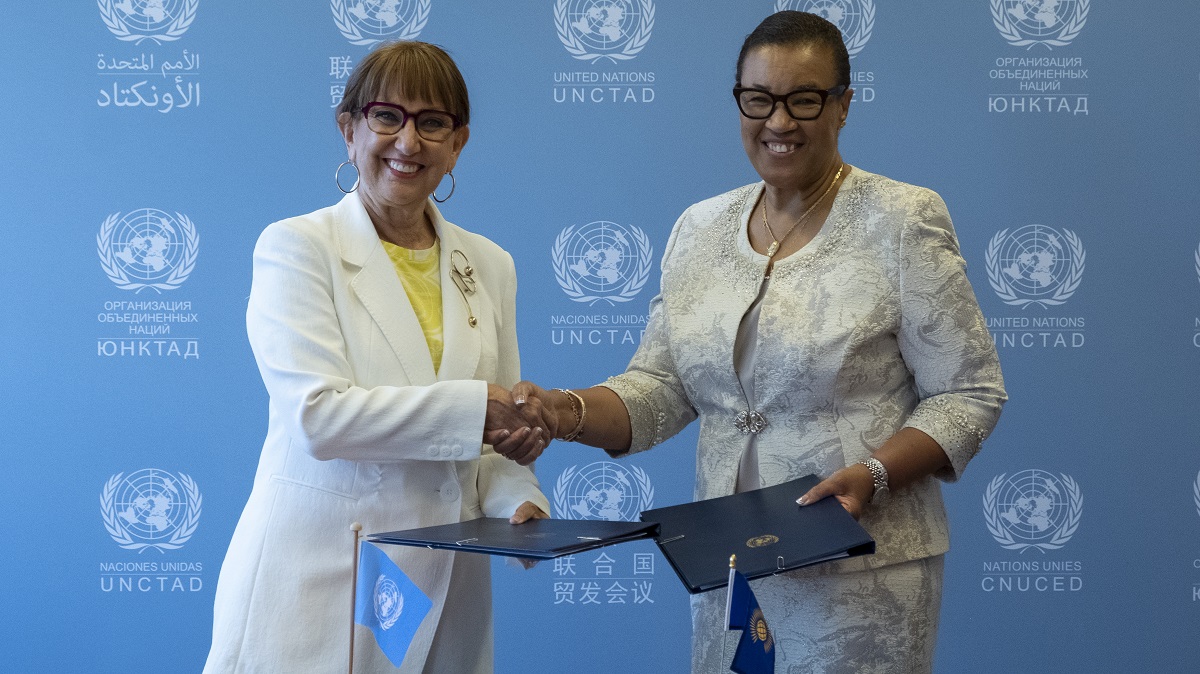The two organizations will broaden their existing cooperation to promote the ocean economy, curb plastic pollution, support least developed countries, bolster the digital economy and boost gender equality.

The heads of UNCTAD and the Commonwealth, Rebeca Grynspan (left) and Patricia Scotland (right), at the Palais des Nations on 31 August 2022.
UNCTAD Secretary-General Rebeca Grynspan and her Commonwealth Secretariat counterpart Patricia Scotland signed a memorandum of understanding (MoU) on 31 August to strengthen cooperation in various areas of work.Secretary-General Grynspan said stronger collaboration would enable the two organizations to contribute more to global efforts to tackle the multiple crises facing the world.
“We are pleased to expand our partnership and open a new phase of cooperation in which we will amplify our joint efforts in supporting developing countries to take coordinated action to address cascading crises and build a better future together,” Secretary-General Grynspan said.
The five-year agreement brings together UNCTAD’s research, analysis and policy work and the Commonwealth Secretariat’s experience in programmes and policymaking, to help countries make progress towards the Sustainable Development Goals (SDGs).
“I am delighted that we have renewed our partnership to support our members, especially small island states and least developed countries, to achieve the SDGs. With the world facing multiple crises from climate change to food insecurity, partnerships like ours are indispensable to help tackle these challenges,” Commonwealth Secretary-General Patricia Scotland said.
The new MoU builds on a decade-long collaboration between the two organizations.
They have worked together on issues related to fisheries, the ocean economy, plastic pollution, least developed countries’ graduation and vulnerability and ensuring trade is part of the solution to the climate crisis.
Under the MoU, UNCTAD and the Commonwealth Secretariat will continue to co-organize the biannual UN Oceans Forum, a key meeting on conserving and sustainably using the sea and its resources.
They will share data and information on the development and use of ocean-based goods and services.
Also, they will promote the ocean-based blue economy and circular economy, particularly in relation to fisheries, climate change and plastic pollution.
Besides, they will assist member states in enhancing their green production and export capacity, as well as enabling a sustainable energy transition in developing countries.
“We are pleased to expand our partnership and open a new phase of cooperation in which we will amplify our joint efforts in supporting developing countries to take coordinated action to address cascading crises and build a better future together,” Secretary-General Grynspan said.
The five-year agreement brings together UNCTAD’s research, analysis and policy work and the Commonwealth Secretariat’s experience in programmes and policymaking, to help countries make progress towards the Sustainable Development Goals (SDGs).
“I am delighted that we have renewed our partnership to support our members, especially small island states and least developed countries, to achieve the SDGs. With the world facing multiple crises from climate change to food insecurity, partnerships like ours are indispensable to help tackle these challenges,” Commonwealth Secretary-General Patricia Scotland said.
The new MoU builds on a decade-long collaboration between the two organizations.
They have worked together on issues related to fisheries, the ocean economy, plastic pollution, least developed countries’ graduation and vulnerability and ensuring trade is part of the solution to the climate crisis.
Under the MoU, UNCTAD and the Commonwealth Secretariat will continue to co-organize the biannual UN Oceans Forum, a key meeting on conserving and sustainably using the sea and its resources.
They will share data and information on the development and use of ocean-based goods and services.
Also, they will promote the ocean-based blue economy and circular economy, particularly in relation to fisheries, climate change and plastic pollution.
Besides, they will assist member states in enhancing their green production and export capacity, as well as enabling a sustainable energy transition in developing countries.



No comments:
Post a Comment